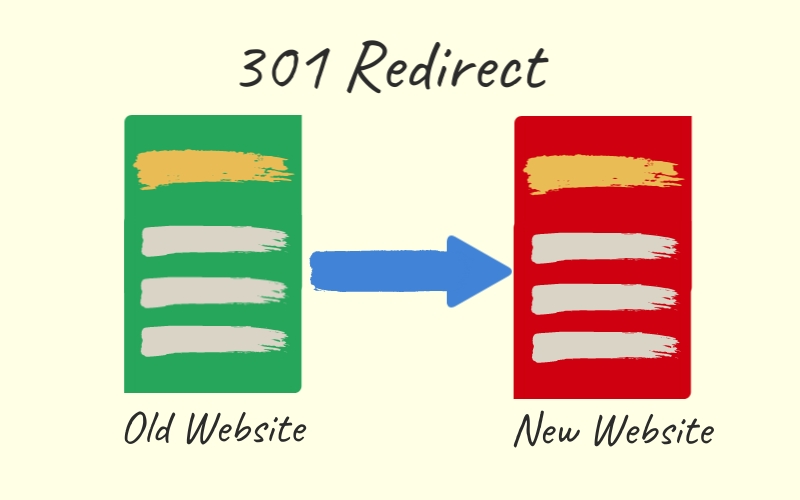Today, you will learn everything you need to know about 301 redirects and how they work.
We will cover the following topics:
- What is a 301 redirect?
- When do you have to use a 301 redirect?
- How does a 301 redirect affect seo?
Sometimes, we have to move from one house to another. It is a permanent move, but there is no way we can tell all our friends to send mail to the new house. The solution to this is a mail forwarding service, where all your mails will be forwarded to your new home.
This service, of course, has a cost.
On another note, this also happens to call forwarding. Maybe you changed your phone number, and the phone company will automatically forward all incoming calls in the old number to the new number. Or sometimes, you want to forward calls made in your office to your home.
For websites, this is called a 301 redirect. It is a necessary thing to do if you changed your domain name, or if you changed the URL of your pages.
Let us take a look at a 301 redirect, how it works, and help you understand how it affects your website performance.
What is a 301 Redirect?
A 301 redirect is a permanent change of URL. If you had an old domain name and want to change it for whatever reason, a 301 redirect is the answer. During a redirect, a site visitor, or anyone who clicks on a link from your old link or backlink, will be redirected to the new location of that page or post.
The site visitor does not know this, but the search engines and browsers do. The 301 redirect is the computer command that basically tells search engines and browsers that you have “moved from one house to another”.
Let us say that your website name is www.ABCCOMPANY.com. So you build this website and all your pages carry this domain. One day, you decide to change the company name to XYZ. Now, you also want to use www.XYZ.com.
It does not make business sense to build another website called www.XYZ.com. It is a waste of money and effort, and whatever domain authority you had for ABC COMPANY will have nothing to do with your website.
In short, you are starting from scratch.
To get around this problem, you need to use a 301 redirect. From then on, anybody who attempts to go to ABCCOMPANY.com will be forwarded to XYZ.com.
If other websites are linking to ABC.COM, these links will also be redirected now to XYZ.COM.
Since the search engines recognize this, the new domain. XYZ.com will retain the domain authority of the original one.
Essentially, you are telling the browser and the search engine that you have permanently left www.ABCCOMPANY.com and you have no plans of coming back. You are also telling the browser that now, you are at XYZ.COM. The browser, upon knowing this, will say “ok, I will send the user to the new domain now.”
When Do You Have to Use a 301 Redirect?
Is there a good reason to use a 301 redirect apart from a domain name change? Yes, there are. Below are some of the most common reasons why this is important.
Maximizing Domain Authority
Sometimes, a domain can come in two forms, one is www, and the other is HTTP. While they have the same domain names, search engines will treat them as separate entities. For example, a website’s name is www.abc.com, and the other is http://abc.com.
These two are the same websites, with the same content, but search engines do not know this. To be able to tell the search engines that they are one and the same, a 301 redirect has to be used.
Rebranding with a different URL
In our example earlier, the old website is ABC.com. Now, we want to name it XYX.com, but still, retain the history of ABC.com.
In this case, a 301 redirect is going to help. All inbound links that used the ABC.com will still be active. If there is a link that leads to ABC.com/how-to-do-SEO, and if it has no 301 redirect, a user who clicks that link will receive an error 404.
Why? Because without a 301 redirect, the search engine thinks it is a dead page.
But with a 301 redirect, that link will remain active, and traffic will come to the new domain even if the old link is used.
Direct traffic by the same company
Some companies buy several domain names because these domain names are too similar to their brand. They use 301 redirect to transfer traffic from these similar domains to their website.
For example, let us say that your business name is Toys.com. Surely, you do not want people to create websites called Toys.net, or Toys.org.
What you want is to buy these domain names, too. And if anybody types Toys.org on a browser, this person will be redirected to your main website, Toys.com. Usually, only big companies do this because it is expensive to buy and maintain patented brand names.
In relation to that, you may also want to buy all domains with the word “toy” without the letter “s” such as toy.com, toy.org, toy.net, and so on.
These are the main reasons for using a 301 redirect, but there are more. For example, you may have made a mistake in the URL name of a blog post, and then you corrected that. What you want to do is to redirect all traffic coming from the old link to the new one.
How Does a 301 Redirect Affect SEO?
Does a 301 redirect affect SEO? Yes, it does. SEO is one of the primary reasons for using a 301 redirect, as it tells search engines that they should maintain the same rankings and authority as the old URLs for the new ones.
If you think about it, it is like getting married. If you were a doctor and changed your last name because you got married, you want people to understand that you are still the same good doctor and that their perception of you should not change.
Back in 2016, Google said that a 301 redirect makes you lose about 15% of your page rank value. Today, Google does not do this anymore. The new link or domain will absorb the authority of the old one.
Which is great. You can change your domain name and still get the same rank and authority from Google. This is liberating because back in 2016, you would be stuck with the same domain name.
You do not want to do a 301 redirect back then because you can lose traffic. Now, it is much more practical to just use a 301 redirect than build a new website.
Summary
A 301 redirect is a beneficial move for a website to retain and improve traffic. If you have the budget, you can buy several domain names close to yours and redirects them all to your website.
At best, you have to use it if you changed your business name, or if you bought a website and decided to change the domain name.
A word of caution: use 301 redirects with the guidance of a web and SEO expert. Doing this yourself can cause page links to break, and make things worse for your SEO.
Recent Posts
Many consumers have divided or negative feelings about marketing practices. Unsustainable marketing breeds distrust—whether it’s the false promise of greater value or convincing customers to buy...
The most significant investment to think about is web hosting to get more traffic and higher performance and run your website successfully after you build it. So it's essential to select the best...


